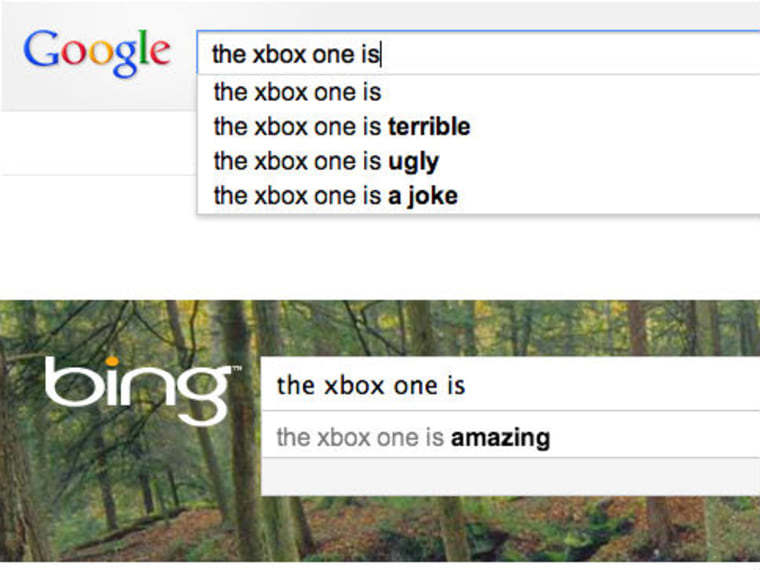Microsoft's Xbox One console has already had something of a social media problem. And it turns out despite the company's recent about-face on some its new console's most controversial feature, this Internet problem extends to search engines. Well, every search except for Bing.
Type the phrase "the xbox one is…" into popular search engines Google and Yahoo, and you'll see the rest autofilled with some nasty results — "the xbox one is terrible," "the xbox one is a joke," "the xbox one is ugly." Things like that.
Meanwhile, when the same phrase was put into Bing (the search engine that just happens to be owned by the same company currently preparing the Xbox One for market), it came up with the rosy phrase "the xbox one is amazing."
Coincidence? I don't want to jump to any accusations or conclusions. But if the swift departure of Microsoft studios creative director Adam Orth following his impolite Twitter rejoinders is any indication, the Redmond, WA-based tech giant doesn't have much patience for online snafus at the moment.
Strangly enough, on the word "the" was taken out of the equation, Bing's search results fall more in line with those of its rivals, as show by the image below:
To its credit, Microsoft is now more responsive to its legions of passionate Xbox fans than it originally appeared. As the next-generation console wars started to heat up last week at the Electronic Entertainment Expo (E3) in Los Angeles, popular consensus from the most eager and vocal gamers seemed to settle on giving Sony the upper hand for its upcoming PlayStation 4.
This didn't have as much to do with the expected features of either the PS4 or the rival Xbox One. Both machines managed to impress anyone looking for a strong line-up of visually stunning video games and a host of secondary entertainment features. Fans didn't appreciate how Microsoft intended to limit use of their new gaming gadget. Online and used game restrictions proved enough of a problem that Microsoft reversed its entire position on digital rights management (DRM) suddenly the Wednesday after E3, leading many of the company's online dissenters feeling like their vociferous protests had been vindicated.
If Microsoft keeps this up, will Google and Bing's autocompletes for the Xbox One eventually come to sound a similar note? Gamers may be still be harboring some wary resentment of the console developer, but it will no doubt be the console's pre-order figures that truly manage to keep Microsoft's attention.
When asked about the difference in autosuggest results, a Microsoft spokesperson told NBC News: "We do not manually alter the results appearing in autosuggest. Autosuggest uses several algorithms to anonymously analyze historical queries from users to generate the suggestions automatically."
— via @BurritoJustice by way of The Atlantic
This story was updated at 3 p.m. ET
Yannick LeJacq is a contributing writer for NBC News who has also covered technology and games for Kill Screen, The Wall Street Journal and The Atlantic. You can follow him on Twitter at @YannickLeJacq and reach him by email at: ylejacq@gmail.com.
